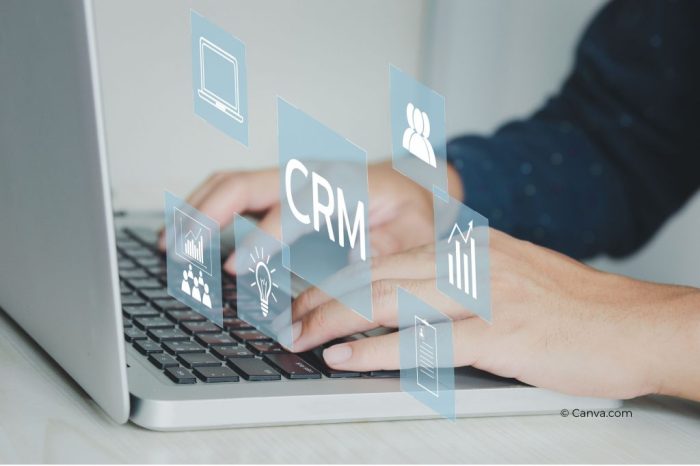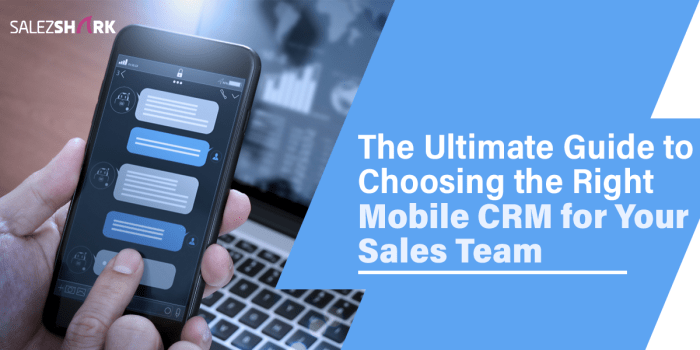Kicking off with Mobile CRM solutions for remote teams, this topic delves into the benefits and functionalities of using CRM tools in a remote work setting. As businesses adapt to virtual work environments, the need for efficient customer relationship management becomes paramount. Explore how Mobile CRM solutions can revolutionize the way remote teams collaborate and boost productivity.
In a world where remote work is the new norm, finding innovative ways to streamline communication and data access is crucial. Let’s dive into the realm of Mobile CRM solutions tailored for remote teams and discover how they can transform the dynamics of virtual collaboration.
Overview of Mobile CRM Solutions for Remote Teams

Mobile CRM solutions refer to customer relationship management tools that are accessible on mobile devices, enabling remote teams to manage customer interactions and data from any location. These solutions are designed to streamline communication, improve efficiency, and enhance collaboration among team members, regardless of their physical location.
Understand how the union of CRM reporting and analytics techniques can improve efficiency and productivity.
Benefits of Using Mobile CRM Solutions for Remote Teams
- Improved Accessibility: Remote teams can access customer data, update records, and communicate with colleagues on-the-go, leading to faster response times and increased productivity.
- Enhanced Collaboration: Mobile CRM solutions facilitate real-time collaboration among team members, allowing them to share information, assign tasks, and track progress seamlessly.
- Efficient Data Management: By centralizing customer data in a mobile CRM system, remote teams can ensure data accuracy, avoid duplication, and make informed decisions based on up-to-date information.
- Enhanced Customer Service: With instant access to customer history, preferences, and interactions, remote teams can provide personalized and timely assistance, leading to improved customer satisfaction and loyalty.
How Mobile CRM Solutions Enhance Collaboration and Productivity Among Remote Teams
Mobile CRM solutions play a vital role in fostering collaboration and boosting productivity within remote teams by:
- Enabling Real-Time Communication: Team members can communicate instantly through chat, calls, or video conferencing within the mobile CRM platform, eliminating delays and ensuring effective communication.
- Streamlining Task Management: Mobile CRM solutions allow team leaders to assign tasks, set deadlines, and track progress, ensuring that work is organized and completed efficiently.
- Providing Insights and Analytics: Remote teams can access real-time reports, analytics, and performance metrics through mobile CRM solutions, enabling them to make data-driven decisions and optimize their workflow.
- Facilitating Remote Training and Support: Mobile CRM platforms can also be used to provide training materials, resources, and support to remote team members, ensuring that they have the necessary tools and knowledge to perform their tasks effectively.
Features and Functionality of Mobile CRM Solutions

Mobile CRM solutions for remote teams come with a variety of features and functionalities that are essential for effective communication, collaboration, and productivity. These features not only streamline processes but also ensure that teams can access real-time data and insights to make informed decisions on the go.
Essential Features of Mobile CRM Solutions for Remote Teams
- Integration with other tools: Mobile CRM solutions should seamlessly integrate with other tools commonly used by remote teams, such as email, calendars, and project management platforms, to ensure a smooth workflow.
- Offline access: Remote teams often work in areas with limited or no internet connectivity, so offline access to CRM data is crucial for uninterrupted productivity.
- Task management: Mobile CRM solutions should offer robust task management capabilities, allowing team members to track progress, set priorities, and meet deadlines efficiently.
- Communication tools: Built-in communication tools like chat, video conferencing, and notifications help remote teams stay connected and collaborate effectively regardless of their physical location.
- Analytics and reporting: Access to real-time analytics and reporting features enables remote teams to track performance, identify trends, and make data-driven decisions to drive business growth.
Real-Time Data Access in Mobile CRM Solutions
Real-time data access is critical for remote teams using Mobile CRM solutions as it allows team members to stay updated with the latest information no matter where they are. By having instant access to customer data, sales reports, and project updates, remote teams can respond promptly to customer inquiries, address issues in a timely manner, and make informed decisions on the spot.
Customization Options for Tailoring Mobile CRM Solutions
Customization options play a vital role in tailoring Mobile CRM solutions to meet the specific needs of remote teams. By allowing teams to customize workflows, fields, and dashboards, Mobile CRM solutions can adapt to different work styles, preferences, and requirements of remote team members. This flexibility ensures that each team can optimize the CRM system according to their unique workflows and business processes, ultimately enhancing productivity and collaboration among remote team members.
Implementation and Best Practices for Mobile CRM Solutions: Mobile CRM Solutions For Remote Teams
Implementing mobile CRM solutions for remote teams requires careful planning and execution to ensure seamless integration and user adoption. Here is a step-by-step guide on implementing Mobile CRM solutions for remote teams:
Step-by-Step Guide on Implementing Mobile CRM Solutions
- 1. Assess Your Team’s Needs: Before implementing a mobile CRM solution, assess your team’s specific requirements and challenges to choose the right tool that addresses these needs.
- 2. Select the Right Mobile CRM Platform: Choose a mobile CRM platform that is user-friendly, scalable, and offers the necessary features for remote teams to collaborate effectively.
- 3. Customize the CRM Solution: Customize the CRM solution to align with your team’s workflows and processes to maximize efficiency and productivity.
- 4. Provide Comprehensive Training: Offer thorough training sessions to remote teams to ensure they are proficient in using the mobile CRM solution and understand its full potential.
- 5. Test and Optimize: Conduct testing phases to identify any issues or areas of improvement, and optimize the mobile CRM solution accordingly before full deployment.
- 6. Rollout and Support: Roll out the mobile CRM solution gradually to remote teams, providing ongoing support and assistance to address any issues that may arise.
Best Practices for Training Remote Teams on Using Mobile CRM Solutions
- 1. Interactive Training Sessions: Conduct interactive training sessions that allow remote teams to actively engage with the mobile CRM solution to understand its functionalities better.
- 2. Provide Access to Resources: Offer access to training materials, guides, and resources that remote teams can refer to for assistance and self-paced learning.
- 3. Encourage Feedback and Questions: Create an open environment where remote teams feel comfortable asking questions and providing feedback to enhance their understanding and usage of the mobile CRM solution.
- 4. Regular Refresher Sessions: Organize regular refresher training sessions to reinforce learning and introduce new features or updates to the mobile CRM solution.
Security Measures for Mobile CRM Solutions for Remote Teams
- 1. Data Encryption: Ensure data transmitted and stored in the mobile CRM solution is encrypted to protect sensitive information from unauthorized access.
- 2. Access Control: Implement strict access controls and user permissions to restrict unauthorized users from viewing or modifying confidential data within the CRM system.
- 3. Mobile Device Management: Utilize mobile device management tools to secure devices used by remote teams, enabling remote wipe capabilities and enforcing security policies.
- 4. Regular Security Audits: Conduct regular security audits and assessments to identify vulnerabilities and address any security gaps in the mobile CRM solution proactively.